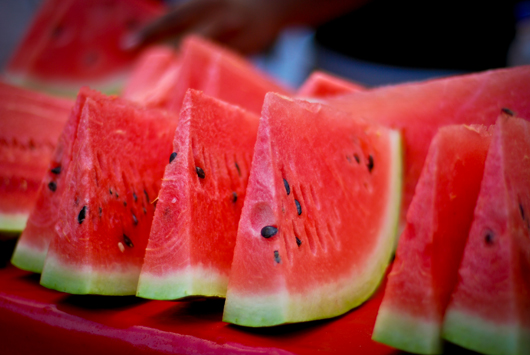Jeddah, May 4: Watermelons being sold in Taif by street vendors have caused alarm. There is a widespread fear that the product is genetically modified and chemically nourished to speed up ripening and increase its size.

The fears have been aggravated following the circulation on social networking sites of a video clip, which shows how the watermelons are upsized with the help of unknown chemicals. Farmers are seen using chemicals to speed up the watermelon’s ripening process and increase its size. Consumers now fear the chemicals could cause cancer.
They expressed astonishment over poor supervision and weak control of the departments concerned over farmers and the produce being sold in markets.
Street vendors said they buy the watermelons in wholesale from truck owners coming from Wadi Al-Dawassir and sell them retail. Commenting on nourishment methods, they said they have noticed the increase in size, which makes them wonder and question why this has happened.
“The drivers said farmers add chemicals to the irrigation water to hasten the ripening process and increase size to enable them to sell their product at higher prices,” said vendors, adding that the price of one watermelon might reach as high as SR50.
Speaking to a local publication, Salem Al-Thaqafi, a citizen said: “One farmer from Wadi Al-Dawassir told me that watermelons coming from there and other areas in the Kingdom are genetically modified and chemically fed to increase its size so it can be sold at high prices.”
Saad Al-Thabti agreed with him. “This is the method used in the farming of all agro products,” he said. “Foreign workers make profits regardless of the health of customers. There is a lack of supervision by the authorities which endangers consumers’ health.”
A source at the Ministry of Agriculture, quoted by the local media, said the ministry always follow up on the work of farmers and hold awareness campaigns to warn them on the hazards of chemicals on human health.






.jpg)
.jpg)

Comments
Add new comment